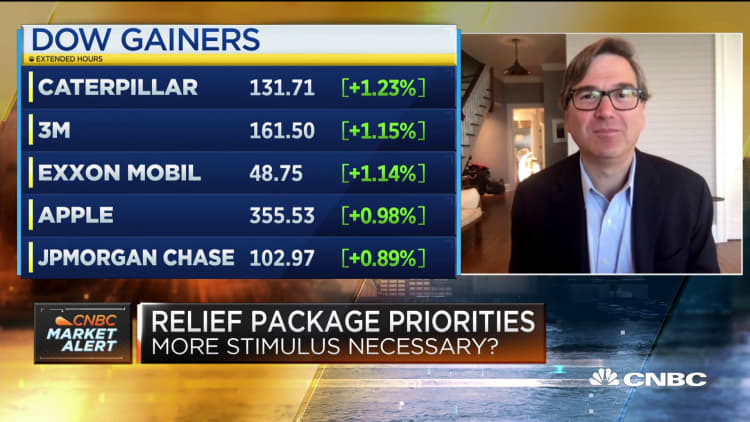
The U.S. economy needs additional government support to continue its rebound from coronavirus-induced devastation, former Obama economic advisor Jason Furman told CNBC on Wednesday.
"I'm still worried we're not close to out of the woods," said Furman, who served in the previous administration as chairman of the Council of Economic Advisers.
"The recovery we've seen so far has been assisted by extraordinary fiscal and monetary support, and if we pull that away too soon, we'll pull the rug out of the prospects for the U.S. economy," he added.
Furman correctly predicted in early April a swift return in economic activity as restrictions on businesses were eased.
During Wednesday's "Squawk Box" interview, Furman said the "tremendous" May retail sales data, released Tuesday, was partly linked to the rise in disposable personal income in April.
Connecting the dots, Furman added that April's nearly 13% increase in disposable personal can be traced back to the various pandemic support programs.
"That carried forward when people were able to spend the money in May," said Furman, currently a professor at Harvard University.
Without additional government support, "you would see some reversal of that in August and September. You'd potentially see us double dip reversal in terms of our economic trajectory," he argued. "I wouldn't want to take my chances on something like that when we're still in a very fragile and very uncertain position with the virus and with the economy."
In a recent op-ed in The Washington Post, Furman, former Obama Treasury Secretary Timothy Geithner and two others, detailed what they believe Congress should do.
"I think the most important thing is we don't let expanded unemployment insurance go away entirely after July," Furman told CNBC. "That would be a large contraction for the economy."
The enhanced federal unemployment benefit, under the coronavirus economic rescue package approved in March, pays $600 per week, up-and-above the jobless insurance offered at the state level, until the end of next month.
Furman and company proposed adjusting the $600-per-week benefit and tying it to the U.S. unemployment rate.
"As the unemployment rate comes down, the extra money you're getting would go down. We'd start with replacing about 90% of what you'd get on the job and then with lower unemployment rates, that would go lower," he explained.
Furman said the key characteristic of their proposals, which include financial aid to state and local governments, links support from Washington to the conditions of the U.S. recovery.
"If you're right that the economy is in great shape, the plan will actually be quite cheap. And if you're wrong, the needed money will flow," he said. "So effectively, it's like buying an insurance policy and that is what I think Congress should be doing."
House Democrats have already approved another stimulus package, but it's a non-starter in the Republican-held Senate. CNBC reported last week that White House and GOP negotiators plan to wait until late July to begin formal negotiations on a fourth coronavirus stimulus package.
Last month, Senate Majority Leader Mitch McConnell, R-Ky., said the next stimulus bill would be the "final" one. Some Republicans are hesitant to pass another large-scale relief bill because of the recently encouraging economic data, including the surprising 2.5 million nonfarm jobs added last month.



